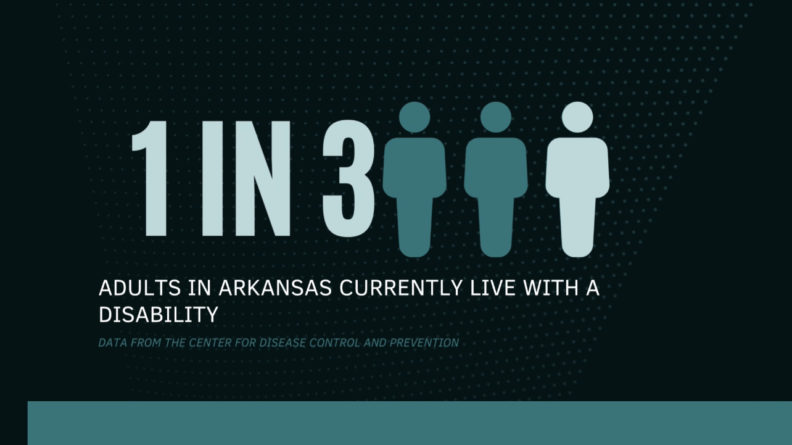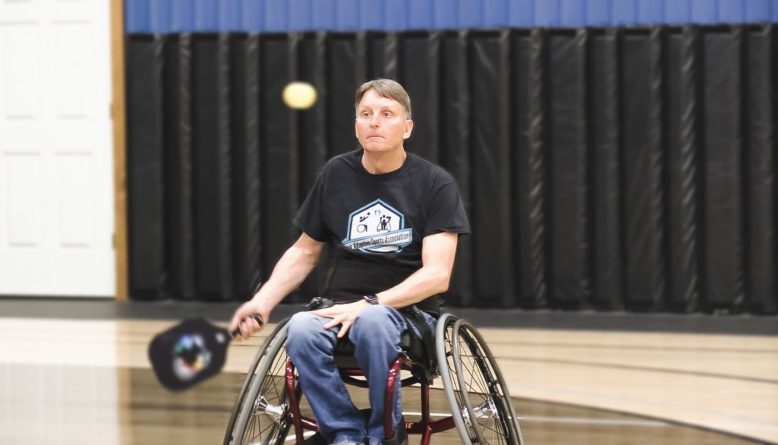By: Autumn Klein
SPRINGDALE, Ark. (UATV) – One in three Arkansans currently live with a disability, according to the CDC. According to the United Spinal Association, only two adaptive sports programs exist in the state. That is why when Sean Kent moved to Arkansas in 2018, he made it a goal to make a change.
Sean Kent is the current founder and president of Ozark Adaptive Sports Association, or OZASA. In August of 2011, Kent traveled to Oregon to visit some friends near the beach. While on his trip, he decided he wanted to dive into the Pacific ocean. Little did he know, this decision would change his life forever. He dove right into a cresting wave that, unbeknownst to him, was concealing a sandbar. Kent hit the sandbar and, face down in the water, was unable to move. He inhaled so much water he became unconscious and was later resuscitated on the beach. As a result of this diving accident, Kent broke his neck and strongly bruised his spinal cord. At the hospital, it was revealed that he had broken his C6 vertebrae. Because this limits mobility in the hands, triceps an torso, this injury left him semi-quadriplegic. His spinal cord injury was incomplete, meaning his spine was not severed. This allowed for Kent to have some movement and feeling in his legs; however, he is unable to feel pain on the left side of his body.
Kent said that following his accident, he was sent to a rehabilitation center where they had to put him on the kids’ floor in the hospital, due to lack of room on the spinal cord floor. He said that watching children as young as five years old who had to get their hands and feet amputated as a result of meningitis, showed him that if they could do it, he could do it too. He went to therapy as much as he could to work to get better. While he enjoyed the physical therapy, he said he did not enjoy the emotional therapy. Support groups were not for Kent.
“While I was in the hospital in Chicago, they kept trying to get me to do support groups, but those weren’t doing anything for me,” Kent said, “It was just people complaining.”
The transition following his injury was not easy. For Kent, the loss of independence was one of the toughest battles to overcome, but complaining did not make it better.
“It’s challenging,” he said, “your independence shrinks, you’re relearning how to live, how to eat, how to sit, how to do everything and it takes time. You just can’t stop you got to keep going.”
To Kent, sports were more therapeutic than talking in a support group could ever be. Just about a year after his injury, Kent discovered a passion for wheelchair rugby.
Kent grew up in Chicago with his family, but they decided to move to Northwest Arkansas in 2018. After making the move, Kent quickly learned that despite the high percentages of people with disabilities in the state, adaptive sports teams did not last long in the area. He discovered that the closest wheelchair rugby team was in Kansas City – over 200 miles away. This is ultimately what led him to starting his nonprofit organization.
Ozark Adaptive Sports Association is Kent’s nonprofit through which he devotes his time and energy into daily to benefit people with physical disabilities in Northwest Arkansas by keeping them physically active. Kent saw a need in the area and decided he would make it happen himself. The program currently offers wheelchair basketball, wheelchair rugby, wheelchair pickleball, adaptive cycling and adaptive mountain biking. They will be offering wheelchair tennis beginning in May and they said they always will take suggestions. All on his own, through donations, grants and raising money, Kent has been able to purchase 10 basketball chairs, six rugby chairs and eight bikes for others to use with OZASA.
Kent said “It’s a lot more fun being in a sports chair than a day chair, or a regular chair.”
Darryl Coit is an OZASA board member, a school teacher and an avid handcycler. Coit found a love for handcycling shortly after he was paralyzed from the waist down in a car accident at the age of 35 years old – just about 23 years ago. He said that he was never really an athlete prior to his accident, but playing sports after his injury has changed his life. 
“I see too many young people with some kind of mobility impairment that really don’t do anything,” Coit said, “and that’s sad. I think a lot of it has to do with awareness.”
Coit was actually working towards starting his own adaptive cycling group whenever he got in contact with the manager of Springdale Parks and Recreation – who also happened to be on the board for OZASA. The Springdale Parks and Recreation facility designates courts for OZASA to utilize. Through this connection, Darryl Coit was able to connect with Sean Kent and, as they say, the rest is history. Coit has now been involved with OZASA for about two years.
Because of OZASA, Coit said “my perception of being disabled changed.”
Adaptive sports have changed the lives of many people like Sean Kent and Darryl Coit; however, it is not that easy or simple to just pick it up and start playing. One of the biggest barriers of adaptive sports is the cost of equipment.
Kent said his rugby chair cost $6,000 in 2013 and he can only imagine how much the cost has increased since then. He compares it to a pair of shoes for an able-bodied person. He said an able-bodied person wanting to start playing basketball would only need to spend maybe around $100 for a pair of basketball shoes. The chair is Kent’s shoes. It is necessary to have a chair to play the sport, as it is necessary for an able-bodied person to have shoes. It is also important to understand that these chairs are specifically made for physical activity. Kent said he could absolutely not go an entire day only using his rugby chair. In order to keep the center of gravity, sports chairs are much lower to the ground than day chairs. The wheels on sports chairs are often angled upward and do not contain push handles. The chair would not be comfortable or efficient for daily use, but it is necessary to participate in the sports. Kent said it is frustrating that people wanting to partake in adaptive sports have to spend almost as much as they would if they were to purchase a car just so they can play and enjoy an activity that able-bodied people can do with pretty much no barriers. This is why Kent has worked so hard to raise money to purchase more sports chairs that he can allow participants to use. Sports chairs are almost never covered by insurance.
Bonnie and Arthur Kent are the parents of Sean Kent. The two together help their son achieve his dreams of getting the word out about OZASA and getting people to come. Arthur Kent said he helps his son fix the equipment and he doesn’t think there is any reason it should cost as much as it does.
“Anything that is considered medical costs three times more if you’re disabled” Bonnie Kent said. She said her son has worked hard to purchase these chairs to share with other people.
“I’ll scream from the rooftops of how proud we are of what he’s done and what he’s accomplished,” she said, “I’ve raised a good person.”
Because OZASA is a nonprofit, the organization relies on donors, sponsors and volunteers. The Kent’s said they need more involvement and have been trying to get more people to come out – both participants and volunteers. For those interested in playing, volunteering or just finding out more information, you can visit the official OZASA website. For anyone interested in providing a donation, OZASA accepts online donations here.
For Sean Kent, his dream for the future of OZASA is to have his own recreational center for not just adaptive sports, but classes, support groups and all other kinds of resources for people with physical disabilities. He believes the disabled community of Northwest Arkansas – and all over – deserve the opportunity to have access to a sports facility suited for them. Kent said he just needs to keep spreading more awareness about who they are and what they do.
“We are slowly building awareness but it takes time,” Kent said.
He said that they have seen significant growth in many different ways. As of 2022, the organization was able to have served over 500 participants. In 2022, OZASA was able to host two regional adaptive sports days, with participants from four different states, as well as an Off-Road Cycling Adventure that had adaptive riders from eight different states. The support OZASA received in 2022 also allowed the organization to purchase four more basketball chairs and five handcycles. Kent and Coit said they anticipate the participation in their upcoming mountain bike event to triple this year in comparison to 2022.
While Kent has many dreams and aspirations for growing and expanding OZASA, he said that he most of all just wants people like him to see that it IS possible, that they can still be physically active and have fun. Sports are an outlet for him, and he wants to build an inclusive community that can give other people the opportunity to experience this as well.
“It’s a confidence builder,” Kent said, “it gets people active and it gets people out.”
Kent said while they are always looking for volunteers to help set up and put stuff away, they are also always looking for volunteers to participate in the activities – able-bodied too. Kent said they enjoy playing against able-bodied people as it is more of a challenge. He said they even love to have able-bodied people try out playing in one of their sports chairs. Kent said almost everyone ends up really enjoying it and they get to show others firsthand what getting around is like for them daily.
Ozark Adaptive Sports Association has many upcoming events for anyone interested. Wednesday, April 26 OZASA will host an open court for adaptive sports from 7-9 p.m. The event will take place at Springdale Parks and Recreation, 1906 Cambridge St., Springdale, AR. On Saturday, April 29, there will be another adaptive sports open court at the same location from 2-4 p.m. OZASA’s monthly calendar of events can be accessed here.

